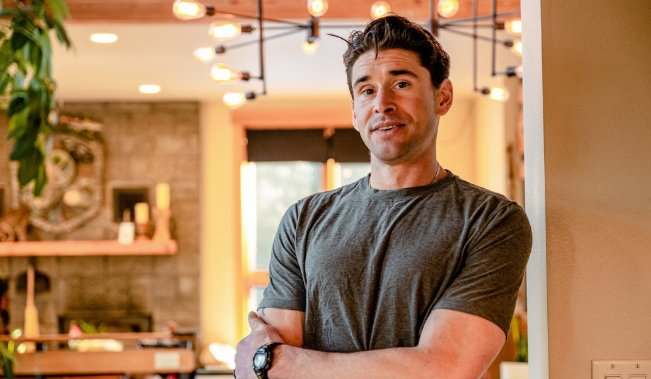Ancestral mismatch?
That’s right: we work in boxes, travel in boxes, live in boxes, sleep in boxes, experience very little temperature stress in an era of air conditioning and indoor heating, sit at screens all day instead of working with our hands and have to fabricate giant boxes full of weights so that we can exercise.
Don’t get me wrong: ancestral humans certainly had to fight hard to survive, but we barely have to fight at all, and as a result, we’ve become weak and mismatched from our primal right to experience life to the fullest, including blood, sweat, tears and the reward of hard work.
“Nobody cares. Work harder.”
This harsh slogan, popularized by a t-shirt worn by Baltimore Ravens quarterback Lamar Jackson, may be the perfect encapsulation of the current mood on the internet these days. The phrase resonates, not because it’s true, but because it speaks to an almost universal predicament. It offers a vivid snapshot of a society in which isolated individuals find themselves competing – physically, economically, and romantically – within the vast network of every interconnected human being on the planet.
To be sure, technology has bred new opportunities like never before. Social media, for example, exponentially expands your access to new ideas. The sheer magnitude of information and possibilities is staggering. And with this volume of opportunity also comes a flood of images of those who seem to be getting way ahead of you.
Instead of feeling empowered by opportunity, it’s easy to feel anxious and depressed. Inadequate. You’re left wondering how somebody else achieved what you couldn’t. Was it luck? Better genes? Did they just work harder? Or could there be another phenomenon at hand?
Back in 1994, evolutionary biologists Randolph Nesse and George Williams saw the storm brewing. In their book, Why We Get Sick, they wrote:
“Mass communication and pop culture effectively make us all one competitive group and destroy more intimate social networks. Competition is no longer within a group of fifty or a hundred relatives and close associates but among five billion people. In the ancestral environment, you had a good chance at being best at something. Even if you were not the best, your group would likely value your skills because not many could do what you do in a small circle. Now we all compete with those who are the best in the entire world.”
So when somebody tells you to just “work harder,” they may be neglecting a much simpler and more fundamental explanation for why you are dissatisfied. You may be comparing yourself to the anomalies of the world. The freaks of nature.
Now back to the concept of this “mismatch”. Nesse and Williams point out that there is a profound mismatch between your ancestral heritage and society today. They go on to show how modern diseases are rooted in peculiar modern lifestyles.
Most people sit indoors through 16 years of schooling in preparation for the next 45 years working under artificial lights in an office somewhere.
Basically, you’re trained from a young age to believe that you need to sacrifice healthy activity, nutritious food, and community to succeed in the rat race for wealth, status, and increased productivity.
It’s no wonder that prescription drugs for obesity, diabetes and anxiety are skyrocketing.
A whole self-improvement culture has also arisen to sell quick solutions for modern problems, and maybe even offer an escape hatch from the rat race. You’re told to hustle until all your dreams come true. But many, and maybe you too, stumble when you try to find a clear sense of purpose in the modern world.
Back in the age of your predecessors, your purpose was simple: survive. Find food, water, and shelter. Defend against threats. Reproduce. You didn’t have the luxury of pondering your passion or life’s meaning, and yet this singularity of focus kept you physically and mentally healthy.
But today, with survival all but guaranteed for most, you must derive your own sense of purpose.
The “mismatch theory” states that human traits that have evolved in one environment can be disadvantageous in a different environment. As evolutionary psychologists John Tooby and Leda Cosmides put it, “Our modern skulls house a stone-age mind.”
Traditional self-help advice often falls short because it doesn’t address the root issue of this mismatch between our evolutionary heritage and the modern world we inhabit.
In a society where basic survival needs are generally met, you may find yourself grappling with a void, a lack of a clear, driving purpose that your ancestors naturally had. Thus, your struggles are viewed as a mere lack of willpower, when the problems run much deeper. You spiral into a paralyzing indecision amidst a sea of seemingly endless opportunities and choices. Having unlimited paths can be as agonizing as having none.
It’s tempting to grasp at the latest gimmick promising a shortcut to career success, fitness, wealth, or relationships. I know what it’s like to chase after shiny objects and novel trends that catch my attention. But I’ve found that this pursuit only leads to exhaustion, and an even deeper questioning of what it’s all about.
The path to finding meaning and fulfillment is not from some guru’s system or “one weird trick.” It’s your birthright. When you struggle, it doesn’t mean you’re fundamentally broken or that you need more willpower. More often, it just signals a mismatch between your ancestral heritage and modern environment.
The solution, then, isn’t just to work harder. It’s to understand where you are currently in relation to your life’s purpose, and to construct a life-map to get to where you want to be.
The Ladder Of Human Potential
Regardless of your objectives, to reach your highest potential, you have to align your actions with certain progressions that unfold in stages.
While there are no shortcuts, there are certain timeless progressions in each area that lead to fulfillment.
Abraham Maslow’s “Hierarchy of Needs” pyramid organizes human needs from most basic (physiological) to most advanced (self-actualization). In the present age of abundance, some stagnate on the lower rungs of Maslow’s hierarchy because it’s within their comfort zone. But others remain trapped below their full potential because they try to ascend too quickly or skip steps along the way.
When it comes to navigating your natural environment, you can chart a hierarchy of values, in order of fundamental importance.
The base levels deal with staying alive and safe – shelter, storage, and basic comforts like furniture. But it’s the higher levels that allow you to thrive and self-actualize – much like Maslow’s hierarchy of needs.
Like climbing a ladder, you can’t skip rungs or actualize your potential without ascending through each successive stage.
This applies to every domain of life – not just our natural environment.
For example, consider the needs of the human body.
Lower down on the pyramid, you have your health – freedom from illness, along with the basic ability to obtain food and water (inputs) and transform them into outputs (energy and action). Higher up is fitness – having a reserve of energy above the basic functional state, and the stamina to do more over a longer period without needing to rest or break down.
From this foundation naturally flows beauty. Physical aesthetics become a higher priority once your lower-level needs are met. An animal doesn’t groom itself until after it secures a food supply. Thus, beauty becomes an outward sign of an organism that has achieved a degree of health, and is ready to go out into the world and pursue higher-order challenges.
As a human, you can also use your energy reserves to pursue bodily excellence through different activities – climbing your own personal physical Mount Everest with a sport, adventure, or challenge of your choosing.
Sadly, some confuse these advanced challenges with the fundamentals, thinking that running a marathon will whip them into shape. Instead, they end up burning out, becoming just another victim of the mindless grind culture brought about by intensified modern competition. A more sane approach starts by strengthening the weak areas of your health and building a baseline level of fitness before proceeding to the higher rungs of physical performance.
Once your body permits you to engage in a life of meaningful, vigorous activity, the final physical imperative becomes extending your lifespan.
Here again, it’s common to see people get the order wrong – guzzling down dozens of expensive vitamins and supplements, thinking it will help them live forever when they aren’t even taking simple steps to take care of their body through nutrition and movement.
When people ask me my thoughts on this or that obscure supplement, I always try to re-align them to the fundamental values of health. Only when I know that someone has already covered the bases do I guide their attention to the nuances of radical life extension.
When it comes to spiritual health, too, there are also no “shortcuts” to enlightenment. Just as you must respect hierarchies in nature and the body, so you also must respect hierarchies in developing your inner wisdom.
After all, spiritual seekers have never faced a wider variety of choices than today. You can join any of thousands of religious groups (or if you don’t have any of the existing options, you can make your own). But good luck finding fulfillment through most of the fast-tracks being touted as the way to transcendence.
Indeed, I’ve encountered more than one seeker who became tragically detached from reality after seeking answers they weren’t ready for – either through plant medicine ceremonies, or new age-y practices that promised miracles without demanding anything from them in return. Like Icarus flying too close to the sun, they glimpsed heights that their foundation couldn’t support and came plummeting back down to earth.
Spirituality is better thought of as a lifelong process that takes a person through successive stages of development. In other words, you must have an understanding and application of the spiritual disciplines and spiritual hard work to be truly spiritually fulfilled.
The five hierarchical values of the human mind and spirit I’ve used to cultivate wisdom over time:
- Integrity (Mind Health)
- Confidence (Education)
- Authenticity (Skills)
- Purpose (Service)
- Transcendence (Awakening, Spirituality)
Below is a closer look at each.
First, integrity refers to your mental health maintenance. Are you at peace with yourself, or do your inner drives battle each other?
Second, confidence means your baseline education/knowledge, beliefs, and mindset. Are you firm in your convictions, or are you blown and tossed around like the foam on a wave in rough seas?
Third, authenticity comes from your skills and talents – apart from any specific organization or community you belong to.
The fourth is a big one. It’s your purpose – the convergence of your health, education, identity, and skills into what you may call your ultimate or spiritual calling. The healthier, more confident, compatible, and authentic you are, the more on-purpose you’ll be.
A life of purpose gives you the best chance at someday achieving the final value – transcendence. At this stage, you move beyond your earthly ego and time-bound identity and awaken to your new role in service to God’s grand plan.
The ultimate tragedy of society’s fallen condition is that most people will never learn of this role because they become too preoccupied with cares of this world – waking up to grind out another paycheck, or keeping up with the Jones’s (who now have thousands of admiring Instagram followers in addition to perfect vacation photos and the house with the white picket fence).
From Confusion To Understanding
If you’re grappling with feelings of purposelessness, confusion, angst, spiritual emptiness, or physical fatigue, know that you’re not alone. Don’t lose hope.
Rather than comparing yourself to an imagined ideal, I want you to focus on identifying and improving areas in your life to elevate yourself to the next level.
I designed my Masterclass with a certain kind of person in mind: someone who has achieved success in one area, or maybe even more than one, but who feels that they’ve been hindered from advancing in other areas by forces that they don’t entirely understand.
Maybe you’ve been crushing it financially, but struggling to find romantic connections or build a lasting legacy. Or maybe you have a thriving social life and community, but have been unable to connect your passion with your livelihood and remain stuck in a dead-end job, working on someone else’s vision.
My approach to teaching starts with the recognition that you have your own starting place. My 6-day challenge gives a taste of what it looks like to design a life-practice that will help you level up in six major areas of life.
The first of those areas was time management. Even within the category of time, there is a natural values hierarchy – beginning with freedom to set your own priorities, and ending in the decision to seek balance.
If you want to be the world’s number one at anything, it might be enough to just “work harder.” However, the primary challenge of designing your life-map is deciding which area, or two, or three, you want to focus on for a given time, and consolidating those gains with the right support.
The book of Proverbs extols the virtues of hard work:
“The plans of the diligent lead surely to abundance.” [Proverbs 21:5].
But it also places emphasis – even more emphasis – on wisdom:
“The beginning of wisdom is this: Get wisdom. Though it cost all you have, get understanding.” [Proverbs 4:7-9]
Achieving a balanced life-practice doesn’t guarantee that you’ll win the Superbowl or become an Instagram celebrity overnight. You can, and should, still specialize in your chosen profession, and aim for excellence. However, you should do this from a place of understanding.
With understanding, you can leverage modern technology (knowledge and resources) to adjust your current environment such that it matches your physical, mental, and social needs.
With understanding, you can still pursue excellence and wealth.
With understanding, you can leave a legacy without compromise.
You can find your purpose, and master your time, environment, body, mind, and spirit.
This program usually costs at least a few thousand dollars when I work with companies and high-level clients.
But as part of my mission to serve those who, like me, desire to live life to the fullest, and to experience deep meaning, happiness, fulfillment, and connection…
I’m implementing an incredible discount for the first-movers who are ready to take action today.





